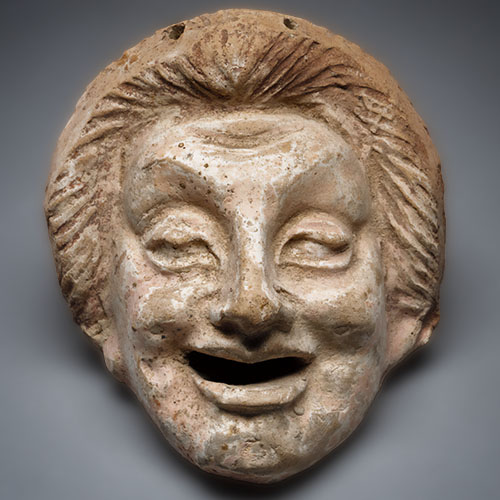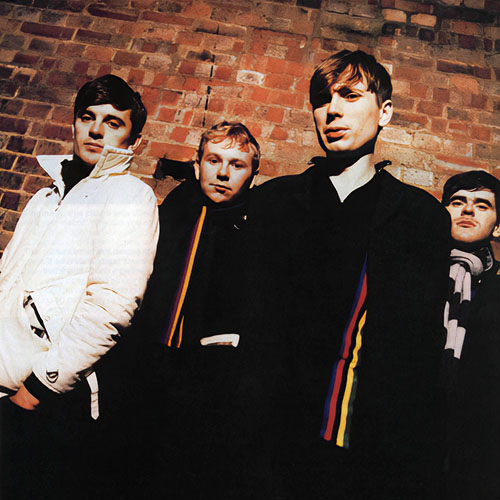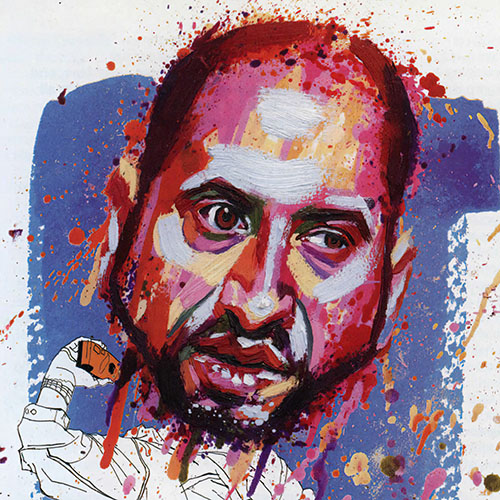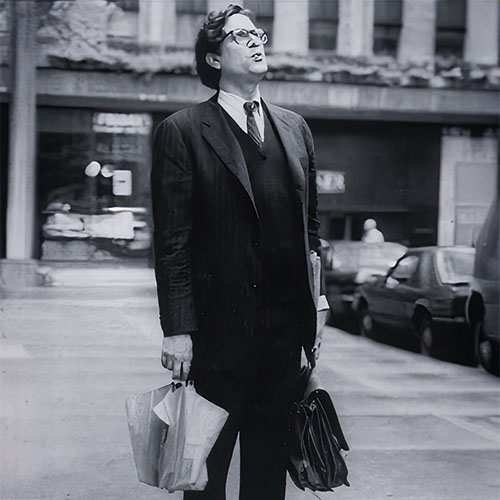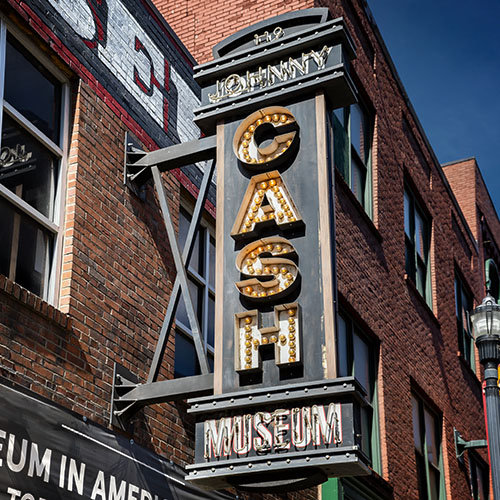Steven Tyler, Joe Perry, Brad Whitford, Tom Hamilton, Joey Kramer. Alone, those names don’t mean much more now than they did 20 years ago. Together, they always have, and always will, mean Aerosmith.
Few rock bands ever become household names, and even fewer last long enough to enjoy that distinction. If you ask any one member of Aerosmith if, in 1973, they thought they would still be at it 15 or 20 years later, bassist Tom Hamilton’s words might sum it up: “Thirty-five to me was like another lifetime.” Now 45, lead singer Steven Tyler would beg to differ. “As long as we remain inventive and keep breaking down walls and living on the edge, I think everybody’s going to always want to come and see what the fuck’s going on.”
For the last 20 years, Aerosmith has been on the top and on the bottom, but always in the public eye. To one generation it was the band everyone loved to hate. To another it was something to identify with, a new voice for a generation struggling with the fast-fading ideals of the late 1960s and the still undefined ideals of the early 1970s. If the oldest child was weaned on the Beatles and the Rolling Stones, and the middle on the psychedelic sounds of Cream and Jimi Hendrix, then surely the youngest had Aerosmith. What you see is what you get-a motto just as fitting in 1993 as it might have been in 1973. They were right there. No bullshit. They weren’t dreamers-they were movers and shakers. They didn’t sing love songs, but millions of teenagers made out in their backseats to the strains of “Dream On.” They never put their audience down, and in turn built a loyal following, a following that now includes the sons and daughters of their original fans.
But something went wrong by the close of the 1970s. Record sales had started to lag, guitarist Joe Perry left to pursue a solo career (a few years later guitarist Brad Whitford would also leave), and success was gradually being replaced by excess. In private Aerosmith had become five individuals who couldn’t “just say no” to anything. In the words of Brad Whitford, “We were still the 18-, 19-year-old kids that wanted to be in a band. We never really got beyond that. We didn’t have a chance to-we were making records and touring and working our butts off. We didn’t really have a chance to grow.”
By 1984 it looked like they might make a second go of it. In June of that year, with no new album to promote, they embarked on their selfproclaimed “Back in the Saddle” tour. It proved to the band and to their ever-loyal audience that the fire was still there. It must have proved something to Geffen Records as well, because by November 1985 they had a new band in their stable and Aerosmith had Done With Mirrors, its first studio release with all five original members in six years. That was followed by 1987’s Permanent Vacation, 1989’s Pump, and three enormously successful tours, the last of which took them around the world in 18 months. Seven million records in seven years-not bad for a band that most critics had once given up for broke.
Get a Grip, Aerosmith’s fourth record with Geffen, was released this past April. In June the band began a tour that will cross the United States and Canada until early October, then resume in Europe for the balance of 1993 and the beginning of 1994.
Maybe the most important change is that Aerosmith is a band that walks where it once ran. Not in terms of speed, but walking with that step that comes from having seen a little more, and perhaps knowing a little bit more, than your competition.
Back in the early eighties, did you ever think that you would be here now?
Steven: No, I was too angry. Joe had left, Brad left. I found people to take their places, but it wasn’t the same. I lived for the moment then, I didn’t think ahead.
Joey: I can remember times when Tom and I used to look at each other and we really didn’t know what was going to happen. Most of the time, we didn’t know what was going on at the moment. But somewhere deep down inside-call it hope, call it faith, whatever-we just held on. And I knew that at some point the band would get back together. There was a point in time where I was really beginning to have my doubts, but I don’t think I ever let go of the fact that I believe that Aerosmith is too strong a source of energy to just disburse, never to be heard from again. I didn’t think that we would come back and be bigger than we ever were or anything like that-I don’t think that was ever really the premise of what we were about. We just do what we do because we love it so much.
Tom: I think I was really naive about it. I didn’t fully realize emotionally how bad it was. When I was home, I would be driving around bumming out because I didn’t know what I was going to be doing the next day. And I’d see people doing menial labor and envy them because they had a thing to do that day and tomorrow and the day after that. I just never believed that it was really over. I remember when there was a lot of talk about putting the band back together that I was still doubtful.
Steven and Joe had communicated every few months during those years when the band was broken apart, but it became obvious each time that neither one of them was ready to do what was necessary to make it work again. When it did finally happen, there was a definite atmosphere of believability that each one of them had realized that a big mistake had been made, and that some changes were going to have to be made in the way people related to each other to make it work better the second time.
Joe: I think a big problem was that we never really thought ahead very much-all we cared about was getting through the next show. I didn’t let myself think about whether the band was going to get back together again or anything like that. When Steven and I first started talking about putting the band back together, it wasn’t like, If we put it together now, maybe we’ll headline [Castle} Donnington in five years. It was more like, Take it one day at a time and see how it goes. What was really important then was getting the band back together for ourselves, then going on to the next thing.
Brad: Even after we got back together, there was still a lot of stuff wrong, and the stuff that was wrong was going to destroy us. But eventually we had to face those things because they were destroying us. The first step, of course, was getting back together. There was something very special about the day that we all sat down at Tom’s apartment. We really hadn’t been all together in quite some time, and you could feel the energy that was there and it felt real good. But immediately we thought everything that was wrong was outside of us, so we fired everybody that worked for us-we figured that would fix everything. It got a little better, but it didn’t fix the stuff that we were not dealing with. We were still the 18-, 19-year-old kids that wanted to be in a band. We never really got beyond that. We didn’t have a chance to-we were making records and touring and working our butts off. We didn’t really have a chance to grow. It took those kind of harsh realities to wake us up.
When did you feel that you had made it?
Steven: When we had the money to buy real groceries and not have to steal them. When that first check came in from CBS. When people started asking me for my autograph and stopped calling me Mick [Jagger]. [laughs] In the beginning you think “make it” means money and girls, then you come to find out that’s not it at all, because it’s the road to it.
Tom: In terms of there being a moment, I always figured that signing a record contract would feel like the moment, that the sun would come out and I’d know that we’d made it. But it really wasn’t like that-it was more of a gradual process. The first time I ever heard an Aerosmith song on the radio was when I felt like we were there, even though I was about two years early.
Brad: Gee, I’d say it was this morning when I got up. (laughs] No, really, I would agree with Tom. Hearing it on the radio really belts it home.Joey: I think things really began to dawn on me when we finally went out on the road for the first time. When we finally did get out on the road, it was kind of an odd combination, because the first band that we toured with was the Mahavishnu Orchestra. It was either go out on the road with them or not go out on the road, so we were all like, “No! We’re going, we’re going.” And I can remember so clearly sitting behind the stage and watching those guys play, and it depressed me. I was finding it hard to say to myself that I was even playing the same instrument as Billy Cobham, but we got such a valuable lesson from being out on the road with them. If I recall, eventually we were paid not to play because we were causing too much excitement. John McLaughlin used to come out and ask for a moment of silence before they started to play. Finally it got to the point where he would come out and ask for that moment of silence, and they wouldn’t be quiet for a minute. It really pissed him off, so eventually we didn’t play.
Joe: Like Tom was saying, it was more of a gradual thing. There was never any time that I can remember where I felt like I’d made it. Because on the one hand, you’ve got the gold record, and on the other hand, they haven’t paid you. You know what I mean? It doesn’t automatically come with the limousine.
It was pretty cool to hear Aerosmith back-to-back with a Stones record on the same radio show. That was cool, but it wasn’t like, Yeah, I made it. You feel better for a couple of minutes maybe, but then you go, It isn’t quite as good as them. It’s like Steven said. It’s the journey.
How do you feel the music business has changed since Aerosmith came together in the summer of 1970?
Joey: I think the most drastic change in the business since we started is obviously MTV. I have my feelings about it, both up and down. When we came back, MTV was four or five years old, and we were just coming out with our first record after getting back together. And we had no experience doing that we never had to have any part of that. It was interesting to watch us not conform, but to adjust to how it was. I think that from the entertainment standpoint, it’s a great thing. There’s a lot of different kinds of bands that have gotten their just exposure due to MTV. At the same time, if a band has a particular song on MTV and kids see it, and they decide from that one song that they don’t like the band, that could make or break them.
I think that it kind of alleviates some of the imagination that used to be involved in the old days, before MTV, when you could ask five or six different kids what a song meant to them and you’d get five or six different stories. Now it’s just laid out there right in front of you. That’s been the most drastic change in the business that I can see. Good ol’ MTV.
Brad: When we started out, nothing like that existed. You either had to have a smash single-and the only way you could do that was to be real bubble gum-or you had to come from England or something. The way we had to do it was to go out on the road and develop a following, and it took years to do.
The Boston sound had come and gone by the time Aerosmith was started-there was the Beacon Street Union, the Ultimate Spinach, and the one band that came out of Boston Orpheum. MGM had a record label, and they came up here and signed everybody-they signed anybody, two guys with a guitar they signed. The same thing still goes on in Seattle. Fortunately, there’s a little more talent up there than there was in Boston at the time. Those things still happen because I think most record executives don’t know. They just don’t know what to do, they hope there’s something else in that neighborhood.
Joe: I think in a lot of ways it hasn’t changed. The technology has gotten better, and the numbers have gotten bigger, but you still have to prove yourself on the boards. Bands that make it on MTV-unless they can put out live, it’s all they’ve got. If they’ve got good songs and good videos, they last on MTV, but they can’t go and play live. There’s bands that are on the Top 10 on MTV that can’t fill the [Boston] Orpheum-some of them can’t even tour. The bottom line is, it comes down to the talent and playing live. The ultimate thing was those lip-sync guys.
Milli Vanilli?
Joe: Yeah. They’re a total product of MTV, and they were what they were. They were bubble gum-pop music. That’s why they call it pop music. When it came time to do the real thing, they couldn’t hack it. So in a lot of ways, it hasn’t changed in 20 years. You still have the record company, the guys with the money, saying, “Kid, I’m going to make you a star.”
You’ve still got to go through all the bullshit, you’ve got to go through the trends. Next year if you don’t have a power tool you’re going to be out of luck, so now you’re going to have all the different power-tool bands. Two years ago you had to look like Guns N’ Roses; six years ago you had to have hair like Bon Jovi. Hey man, in 1973 you had to get your songs on the radio. The only way a band like us got on the radio was by having a ballad. We’re still playing the same games. The numbers are bigger, but that’s about it. I’ve heard more bad songs that have made it because of MTV than good songs that haven’t.
Having done what you’ve done for over 20 years, do any of you feel that you’ve missed anything or that something has passed you by?
Steven: If I’d met a girl as fine as my wife, I’d have gotten laid a whole lot more.
Joe: Yeah, well, especially these past six years, I lost my chops as a drug addict, and I’m looking forward to getting back to that as soon as I quit rock ’n’ roll. [laughs]
Steven: He rolled a fine bill in his time.
Joe: I can’t think of anything else I would rather have been doing. It’s a great job-I’d recommend it to anybody.
Joey: I have a friend in California who I have known since I was about 12. He was telling me the last time I saw him about a time when we were standing out in front of school, and we were talking about having seen the Beatles on TV the night before, and he was saying to me how he was going to grow his hair a little longer and be like the Beatles. And he told me what I said to him was, “Not me, man. I’m gonna be the Beatles.” Playing in a band is what I always dreamed about. So here I am, 25 years later, still living my own fantasy.
Tom: We even call him Ringo. [laughs)
Joey: I guess I can’t really ask for too much more than that. I don’t really feel like I’ve missed out on anything.
What are you most proud of?
Tom: The music. Just having participated in the body of music that this band has put out. The other day this friend of mine gave me a bootleg of us playing in Detroit in 1974, and it was like listening to somebody else. I’m listening to it thinking, God, those little shits can really play [laughs)
Joey: The music is always a part of it for me because it’s something that I’m always thinking about, and I’m proud of what I do. But I think that a lot of my pride comes from the progress that I’ve made learning how to be a better human being, and just learning how to enjoy life and enjoy other people and not be so locked up inside myself. There’s so much more to life outside of ourselves, and I feel that in the last five or six years I’ve really started to learn how to enjoy that, how to utilize that successfully. For me it was a lot of work and a lot of effort, and I’m at a place now that I’m really proud of as far as all that is concerned.
If someone told you today that you had to give it all up-the records, the tours, everything-that you were just going to be a regular guy, what would you do?
Tom: I’d come and get your job. [laughs] No, I’d probably dive into writing-fiction or memoir-type reflections, but I’d like to write fiction. Or maybe some amateur theater, see where that would take me. I haven’t really done any writing, but I’ve been doing a lot of reading about writing. [laughs] Someday if I feel like I have a long string of time where I could get a routine together, maybe I’ll consider it.
Joey: To some capacity I would hope music, but I would definitely get involved with teaching kids. People ask me all the time about giving lessons, and because I’m a street player, I didn’t learn how to play by getting lessons. I don’t really know how to give them, but I’ve never made an attempt to get in touch with that, so that’s one thing that I would do to try and pass it on and maybe help out some kids. It’s something that I think I could enjoy, and regardless of whether I had what I have now or not, I still believe that whatever you’re going to do, you need to enjoy it first and reap the satisfaction for yourself in order to be successful at it. I see teaching as being real rewarding.
Do you still have goals?
Steven: Just to be able to keep it simple. Every day I wake up, the shit gets more complicated, and I get abducted by more brain surgeons than you have ever seen in your life, each one overloading me with information. It started from a real simple premise rock till I drop.
I want to be able to be there for my kids like my parents were for me. If my parents weren’t there for me, I’d be off in some rehab or somewhere and I’d have a lot more problems than I’ve got now. That’s one of those lessons that I’m learning.
Joe: The music is my life-that’s what I do. That’s one of the things that I felt like I’d lost in the late eighties, and that’s one of the things that we’ve got back. Music’s the thing that I always wanted to do. That’s the thing that got me to stay in my room and play my guitar; that was the thing to me that I lost and now I’ve got back, the music. That is my life-everything else kind of fills in the slots around it. I like to do little side things, but this is a full-time fucking job. I just want to live through the next plane flight-nothing too big.
Joey: I don’t think I’ll ever be as good as I want to be, because there’s always room to get better. I spent 20 years of my life struggling with my instrument by myself, and it got me to where I was, and within the last two years, I got this brilliant idea-Wow, why don’t I take some lessons? And I went and found the right guy, and took about a half a dozen lessons, and it opened up doors for me that I had no idea could be opened. The relationship with an instrument is one that goes on as long as you play it, and even afterwards, when you may someday put it down, it still goes on. It’s just something that’s in your blood all the time. The other thing that I set as a goal for myself is, I’d like to become more accomplished as far as my songwriting goes, which is also a new door that I’ve gotten into recently. It’s really fun, it’s really interesting, and I find that I would like to possess a little bit more musical knowledge in order to go on further in that.
When you’re putting a record together, do the messages that you may be sending to kids concern you? Does fatherhood affect your decisions?
Tom: I have a lot of faith in young people. I remember when I was in high school, I was pretty good at separating the bullshit from the stuff that I really needed to take in. But when I think about kids now in high school and I going into college, what they’re subjected to, its just a barrage. There’s a lot of brutality in it in terms of the messages they get from the media, and the messages I think I would get if I was a kid watching TV today would be, Fuck as often and as long as you possibly can. It may kill you, but do it.
I’m not really concerned about our message. I think there’s a lot of freedom and sexuality to it, but not the brutality or exploitation.
Brad: I think people deny the problems they have with sex and sexuality issues. Sometimes that’s why people are offended, but being alive is being sexual, and singing is about being alive, and music is about being alive. I agree with Tom. I don’t think there are any victims in our music. People certainly try and look for it, but I think it’s all in fun. I don’t think we are crossing any serious lines. I’m sure I would have a problem with it if I thought we were, because I am a parent.
Joe: Anytime you’ve got someone nagging at your heels, you’re not going to write your best stuff. We throw everything on our table – it’s you, you have to. But I think that there’s some amount of editing that goes on after the fact. Its not that I’m worried about editing for kids, its stuff that doesn’t feel right for us. I don’t think we have some kind of weird perversion that were going to let out if we don’t watch it and send a bunch of kids out buying lubricated leather, you know?
We’re basically pretty grounded. Speaking for me, anyway. I’m not quite sure about you, Steve. I don’t believe in censorship, but I think the artist does have some responsibility. There was a thing in the paper today about Paul McCartney – MTV wont show his video because he says “fuck” in it. meanwhile, their spokesperson said that they don’t want to play it because it doesn’t meet their standards. MTV’s standards just happened to change with the wind depending on their ratings. Meanwhile they’ll show some rapper with a fucking gun. They’re not thinking about what kind of effect that has on the youth of today. They’re just wondering about what they can get away with for their ratings. It’s not so much censorship about, what’s right and wrong. Unfortunately, that’s not the stuff that you hear. What you hear is, they won’t play it because you won ’t sell as many records. It doesn’t have anything to do with morals, as far as I can see. The only people that edit us morally are us. The rest of it’s this fucking blanket thrown on it under the guise of morality and it is really capitalism. And I’m a capitalist, like everybody else, but it pisses me off when it comes down to money.
Steven: Everybody’s got to put their two cents in and tell you what to do and what to say and what to sing, and you better be careful and you better, better, better … And in the end, when you go to sleep at night, you got to do what you do. I think that when you bring your kids up the right way, they’re going to see and hear stuff anyway-life is so random. It’s how they deal with that information. I think that if I teach my kids what’s going on, what’s up and coming, just give them good foundations, I can let them decide for themselves. If you’re there for them the first time they see it and they’ve got some questions and they’re into talking, you can talk to them about it.
Joe: You’ve got to consider, we’re pretty forward thinkers here, because 30 years ago this music we’re talking about was considered the devil’s music. And if you heard it, even the first three measures of a Chuck Berry song , it made you want to go out and fuck like a dog. I don’t believe that that’s true — usually you have to get halfway through the song. [laughs] Things have come a long way. That’s the kind of fear fucking rock ’n’ roll used to put into people, and I still think there’s some of that there. There’s a reason why Pat Buchanan was on the podium at the [Republican] convention. I mean, there’s a lot of people that buy into that shit, and if you think just because Clinton’s in there that that’s going to go away, it ain’t true.
Steven: It’s an insane world out there. You wonder what kids think when they see Anita Hill and Clarence Thomas on TV and who is on the dais but [Ted] Kennedy. Now, what would a schooled person think about that? What ’s a kid supposed to think about that? If they’re worrying about censoring certain words off of TV … isn’t that part and parcel? Think about how insane that is.
Speaking about the White House, what about Tipper Gore rearing her head again? Does it frighten you, having “Ms. Rock Censorship” as the Second Lady?
Joe: No, because Hillary is the First Lady. I’m not worried one bit. They really had to put a lid on that. There’s no way Bill Clinton was going to get on MTV and be successful there if there was any hint of that shit going on. A big part of his constituency now is the MTV generation, and if he was to go around and start supporting that shit, it wouldn’t go well for him. And he owes us now. If Bush had won, he would have owed Pat Buchanan, you know what I mean? The line in, well, it went the other way, man.
If you had to explain to somebody what Aerosmith was all about, could you hand them a “Get A Grip” and leave it at that?
Tom: Yeah, it’s like the Aerosmith of Toys [in the Attic] and Rocks coming around to meet the Aerosmith of now.
Steven: Yeah, because it’s aggressive. It’s angry. We took a lot of risks on it.
Joe: It’s definitely riskier than the last one. I think that we got a little closer to what Aerosmith is about as far as from the early days. That side of us is there and always has been, but I think we had so much to prove to people coming out of that hole that we came out of. We’re not exactly the newest kids on the block. You have an advantage when you’re a new band. You’re new, that’s a really big thing. When you come back, you’ve already got this history. You’ve got to re-invent yourself and reprove yourself-it’s really fucking hard. This record is closer to what Aerosmith is about. There’s more of the essence of the shit that made me, as a 17 year old, want to grab a guitar and get captivate by that backbeat.
If you had it to do all over again, would you change anything? If so, what would you change?
Tom: That’s another one of those questions that everybody asks that’s very hard to answer. I like the way things are, so I’m not thinking a lot about change.
Steven: Somebody asked me that the other day, and I could honestly say no.
Brad: I would have protected my hearing a little better, otherwise I wouldn’t change a thing.
Joey: I would have to go along with that. Other than not protecting my hearing, I agree with Tom. Had things been different, I don’t think that we would be in the place that we are at now, and the place that we’re at now I love. I can’t imagine it being any better.
Tom: I was just thinking that if I wanted to change anything, I would have practiced twice as much. I would have taken steps to be twice as good as I am now on the bass or as a musician in general-
Brad: You would have been in a different band. [laughs]
Joe: I don’t think I would change anything, because I don’t think I would have had as good a life now. Who knows? Who the fuck knows? All I know is that where I’m at right now, it’s as good as it could be. I wouldn’t dick with anything. You got an equation here with a thousand things going into it. If you change one thing, who knows where it would be at now?

















